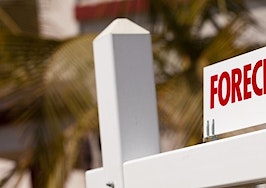- The report found that 12.1 percent of U.S. mortgage homeowners were underwater in the second quarter of 2016, down from 14.4 percent a year ago and 12.7 percent from the previous quarter.
- Areas in the west, such as San Jose, San Francisco, Portland and Denver had less than a 5 percent negative equity rate in the second quarter of 2016.
- Midwestern cities Cleveland and Detroit had the biggest gap between underwater homeowners in the suburbs and urban centers, at 13.6 percent and 10.8 percent, respectively.
We’re past the housing crisis, right? According to the second quarter Zillow Negative Equity Report, a lot of homeowners are still feeling the crunch.
Five years into the housing recovery, and 12.1 percent of mortgaged homeowners are underwater, according to the website’s research team.
In the second quarter of the year, the number of homeowners underwater dipped from 12.7 percent in the first quarter of 2016 and 14.4 percent since one year ago. The report measured both urban and suburban locations, finding that 13.7 percent of U.S. urban homeowners are underwater, and 11.2 percent of suburban mortgage holders are dealing with negative equity.
“At its worst, negative equity touched all kinds of homeowners in all kinds of markets,” Zillow Chief Economist, Dr. Svenja Gudell, said in a statement. “The type of community a given home was in — urban or suburban — mattered little. Fast-forward a few years, and the relative vibrancy of a given community and how it has performed over the past few years, and not necessarily its location in the city or suburbs, matters a great deal.”
Throughout the country’s largest metros, urban homeowners are just a sliver more likely to be dealing with negative equity, Zillow says, but the gap between those homeowners is within 2 percent in 13 of the country’s biggest metropolitan areas.
The gap is wider in some cities, like Cleveland and Detroit, which are still pulling themselves out of the recession and moving slower than many other parts of the nation.
In Detroit, 11.8 percent of suburban homeowners are underwater as of the second quarter of 2016, Zillow says, while 22.6 percent of urban homeowners are in negative equity. The overall negative equity rate in the city was reported at 14 percent in the second quarter of the year, marking a dip from 18.3 percent reported the same time last year.
Cleveland’s urban homeowners are even more likely to be dealing with negative equity: as of the second quarter, 27.2 percent were underwater. Suburban negative equity in Cleveland was reported at 13.6 percent. Overall, 15.5 percent of homeowners in the metro area were underwater in the second quarter, compared with 18.3 percent a year prior.
The largest Midwestern city isn’t faring much better. The urban center of Chicago had the second highest reported negative equity for the second quarter of the year, behind Cleveland, at 25.7 percent. Suburban negative equity was reported at 17.3 percent.

The west coast is the best coast
San Jose homeowners are the least likely to experience negative equity, according to the report. The metro’s most current negative equity rate for the second quarter of 2016 was 2.4 percent, down 1 percent from the previous year. The urban negative equity rate was reported at 2.7 percent, just a sliver over the 2.3 percent negative equity rate in the suburbs.
In nearby San Francisco, the negative equity rate overall was 4 percent, down from 5.4 percent in the second quarter of 2015. The second quarter’s urban negative equity rate of 4.1 percent was a bit higher than the 3.7 percent of underwater homeowners in the suburbs.
In Los Angeles-Long Beach-Anaheim, the negative equity rate overall was 6.1 percent, Zillow says. While it’s higher than northern California cities, it was a decent dip from 7.8 percent the previous year. In the urban areas, 6.8 percent of homeowners are underwater, compared with the 5.5 percent of suburban homeowners experiencing negative equity.
Across the country
Headed to the opposite coast in New York-Northern New Jersey, 13.3 percent of urban homeowners are underwater, compared with 10.4 percent in the suburbs, according to the report. In New York City, the over negative equity rate dipped from 12 percent to 11 percent in the second quarter of the year.
The nation’s capital had a slightly higher rate of negative equity. The overall negative equity rate in Washington D.C. dipped from 16.4 percent to 14.2 percent year-over-year. The urban underwater homeowner rate was reported at 15.7 percent in the second quarter, compared to 13.6 percent of homeowners in the same situation in D.C. suburbs.
In Miami-Fort Lauderdale, the negative equity rate was 14.1 percent in the city center and 11.2 percent in the suburbs, Zillow says. The negative equity rate for the second quarter of 2015 was reported at 16.3 percent, compared with 11.8 percent this year.
Zillow didn’t report on Houston’s negative equity rate, but it says Austin is faring pretty well overall. In the second quarter of 2016, 6.9 percent of homeowners were reported underwater. This is a slight increase over the 6.4 percent of negative equity in metro during the same time last year.













